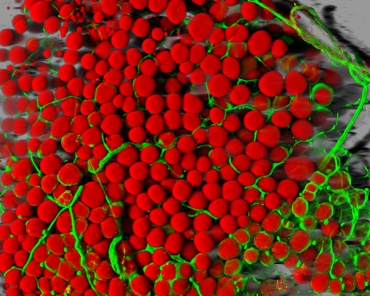
DNA methylations occur when methyl groups bind to the DNA. These can either activate or inactivate genes. Epigenetic factors modify histone tails by e.g. transferring methyl or acetyl groups on lysine side chains. This can complicate or facilitate the activation of a gene. The direct methylation of the DNA changes the gene expression permanently if it takes place in the control regions of genes (so-called CpG islands), that have been made accessible by the modification of the histones. Credit: Copyright: DIfE
Scientists have shown in a mouse model that the epigenetic* modification of the Igfbp2** gene observed in the young animal precedes a fatty liver in the adult animal later in life...
Read More









Recent Comments